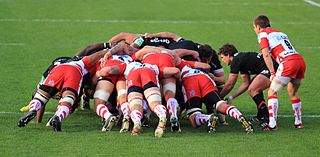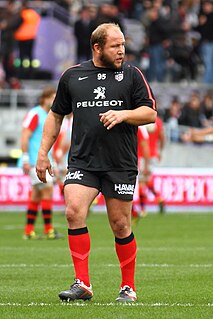
A scrum is a method of restarting play in rugby that involves players packing closely together with their heads down and attempting to gain possession of the ball. Depending on whether it is in rugby union or rugby league, the scrum is utilized either after an accidental infringement or when the ball has gone out of play. Scrums occur more often, and are now of greater importance, in union than in league. Starting play from the line of scrimmage in gridiron football is derived from the scrum.

In the game of rugby union, there are 15 players on each team, comprising eight forwards and seven backs. In addition, there may be up to eight replacement players "on the bench", numbered 16–23. Players are not restricted to a single position, although they generally specialise in just one or two that suit their skills and body types. Players that play multiple positions are called "utility players".
A rugby league team consists of thirteen players on the field, with four substitutes on the bench. Each of the thirteen players is assigned a position, normally with a standardised number, which reflects their role in attack and defence, although players can take up any position at any time.

Five-eighth or Stand-off is one of the positions in a rugby league football team. Wearing jersey number 6, this player is one of the two half backs in a team, partnering the scrum-half. Sometimes known as the pivot or second receiver, in a traditional attacking 'back-line'. play the five-eighth would receive the ball from the scrum half, who is the first receiver of the ball from the dummy-half or hooker following a tackle.

David Gallaher was an Irish-born New Zealand rugby union footballer best remembered as the captain of the "Original All Blacks"—the 1905–06 New Zealand national team, the first representative New Zealand side to tour the British Isles. Under Gallaher's leadership the Originals won 34 out of 35 matches over the course of tour, including legs in France and North America; the New Zealanders scored 976 points and conceded only 59. Before returning home he co-wrote the classic rugby text The Complete Rugby Footballer with his vice-captain Billy Stead. Gallaher retired as a player after the 1905–06 tour and took up coaching and selecting; he was a selector for both Auckland and New Zealand for most of the following decade.
Peter John Slattery was a rugby union player playing in the position of scrum-half. He played 17 matches for Australia, and was a starting player during the 1991 Rugby World Cup.

Thomas Sydney Griffen was an Australian rugby union player who competed in the 1908 Summer Olympics. Griffin, a hooker, was born in Sydney, New South Wales and claimed a total of six international rugby caps for Australia.

Francis Bede Smith, known as "Frank" or "Bede", was an Australian rugby union player who competed in the 1908 Summer Olympics. Smith, a centre, was born in Wellington, New South Wales and claimed a total of 4 international rugby caps for Australia. His debut game was against New Zealand, at Dunedin, on 2 September 1905.

Gary van Ginkel Botha is a former rugby union player, that professionally played as a hooker between 2002 and 2013. He spent the majority of his career at his home-town team the Blue Bulls and their affiliated Super Rugby team the Bulls, but he also had spells at the Sharks, at English side Harlequins and at French Top 14 side Toulouse. He also played in 12 test matches for South Africa from 2005 to 2007.
John "Jack" Elliott was a Welsh rugby union scrum-half who played club rugby for Cardiff and international rugby for Wales, winning three caps.

James Hanson is a rugby union player for Gloucester Rugby in the Aviva Premiership, playing as a hooker.

John Arthur Fihelly was a rugby union player who represented Australia, a professional rugby league footballer, a founder of the Queensland rugby league, and a Labor Party politician.
John Garven "Jock" Blackwood was a rugby union player who represented Australia.
Francis Wallace Meagher was a rugby union player who represented Australia.
John Wylie P. Breckenridge was a rugby union player who represented Australia.
Jonathon Parker Laidley White is an Australian former national representative rugby union player who made twenty-four Test appearances for his country between 1958 and 1965. He is regarded as one of Australia's finest rugby football players of the 20th century.

Raymond "Ray" Barkwill is a Canadian rugby union player who currently plays for the Seattle Seawolves of Major League Rugby and the Canada national rugby union team.











